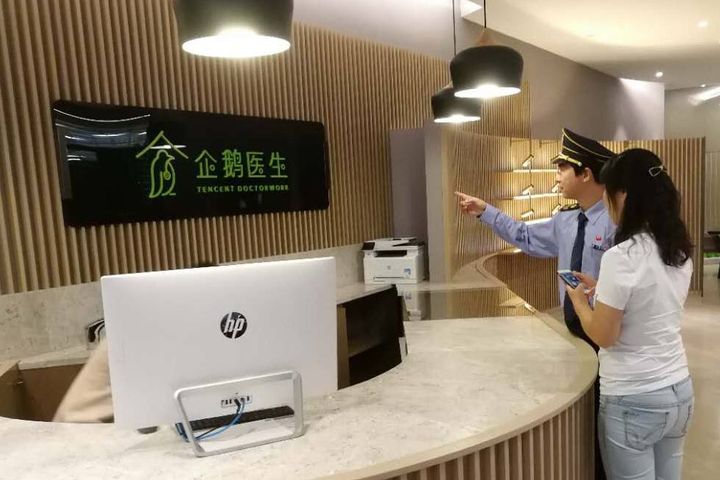 Tencent DoctorWork's Biggest Challenge Is General Practitioner Shortage, CEO Says
Tencent DoctorWork's Biggest Challenge Is General Practitioner Shortage, CEO Says(Yicai Global) Oct. 13 -- A lack of qualified general practitioners is the most serious cause for concern as Chinese internet-based medical service provider Tencent DoctorWork moves to open four to five flagship online clinics and 200 to 300 satellite clinics in the next three years, Chief Executive Wang Shirui told Yicai Global.
The group currently has three flagship clinics in Chengdu, Shenzhen and Beijing.
Each cost tens of millions of yuan to build, and the payback period for the latest one in Beijing is expected to be three to five years, he said. A considerable proportion of the investment will be spent on research and development at the Beijing location, said Wang. A satellite clinic requires less backing and its payback period is shorter.
Tencent DoctorWork's first step is establishing clinics. Finding affiliates is the second.
The group will attract existing clinics to join its service network and apply its uniform standards for department setup, supply chain management and patient services.
The third phase is resource sharing. Medical services provided by DoctorWork clinics and its affiliates are not enough to satisfy demand, so all players must share their core resources, especially medical examination and test service ones, Wang said.
Founded two years ago by Tencent Holdings Ltd. [HKG:0700] and several leading venture capital firms, the Internet+Medical Service startup serves as a platform to integrate online resources with offline medical practices in response to the shortage of general practitioner services for Chinese families. It studied existing clinics and found that it would be difficult to transform the medical service market.
The business model that Tencent DoctorWork originally envisaged is similar to those of private medical practices in the West, where general practitioners provide families with full life-cycle health care services. China's middle-class and wealthy may be receptive to the Cleveland Clinic, MinuteClinic and Kaiser Permanente models.
Operating offline clinics poses serious challenges for internet companies. Building a successful online medical service involves far more than connecting patients and doctors via the internet, Wang said. An internet clinic also needs to offer medical examination and test services because doctors cannot give diagnoses and treatment advice without test results, he said. Drug procurement and payment processing can be time consuming too, said Wang.
"Lack of general practitioners is the biggest challenge," and Tencent DoctorWork is trying to build its own GP training system, he said.
Each of the four to five flagship stores should have 10 in-house GPs, and every satellite clinic must have two GPs, the firm estimates. The shortage of medical practitioners is compounded by a huge demand for household services. Every flagship store needs 500 to 600 GPs to cover household services, and every satellite clinic needs 50 to 150 GPs of this type.
The firm also needs to effectively match doctors' working hours with demand. Its existing service model is primarily limited to online communication between patients and doctors, which is too simple to be effective, said Wang.
"Doctors are not consultants," Wang said. "Apart from consultancy, they should focus on conducting checkups, giving prescriptions and performing surgeries."
This means physicians must practice at multiple sites and although the government has introduced policies to encourage multiple-site practices, they have not been very effective in terms of giving the public easier access to medical services, he said.